3 / 5
How much you enjoy Star Trek Into Darkness will largely depend on your appreciation of certain of the previous big-screen Star Trek adventures, though 21st-century Internet decorum dictates I refrain from saying exactly which one.
But it's the measure of 2009's Star Trek and now the confusingly titled Star Trek Into Darkness (what is this darkness into which the Starship Enterprise is trekking?) -- and certainly a measure of the pop-culture-obsessed times in which we live -- that a great part of the enjoyment and ultimately the disappointment of this film is counting the allusions to other movies.
In just over two hours, I noticed references to Robocop (and not just in casting), Inception, The Silence of the Lambs, The Poseidon Adventure, Avatar, Raiders of the Lost Ark and at least three, maybe four, of the previous Star Trek movies. Its giddy, wink-wink fanboy self-satisfaction becomes not only distracting, it does the film itself a disservice: Instead of creating something boldly, entirely new, J.J. Abrams and a team of high-profile writers have crafted a Frankenstein-monster version of Star Trek, and it's hard not to notice all the different parts stitched together.
But it moves at a relentless -- almost exhausting -- pace, so by the time you notice and start thinking about what it means, you've missed the rapid-fire exposition. It goes something like: Kirk (Chris Pine), Spock (Zachary Quinto) and the Enterprise have to hunt down a terrorist who appears to be a Starfleet officer, and in the process discover that the peaceful tools of the 23rd century are being turned into weapons of war. That's the easiest way to say it.
It's quite understandable if you come out of Star Trek Into Darkness not really understanding quite exactly what happened, because the movie never really pauses long enough to make its story seem meaningful or terribly coherent. There's no lack of plot, but not quite enough of a story.
It's nonetheless a lot of fun, mostly, and a perfect example of escapist summertime entertainment, whizzing and gleaming, spinning and exploding in just the right amounts to never once let anyone in the audience be bored.
Keep in mind, though, that the Trek unfaithful have long accused both the series and more than a few of its subsequent movies of being just that: boring. They consider questions of ethics, moral imperatives and philosophy with abandon: 1982's Star Trek II: The Wrath of Khan, arguably the pinnacle of Star Trek entertainment of any sort, was an unapologetic rumination on aging, maturity and friendship. Thirty years later, those are hardly the sort of topics a studio wants to gamble $200 million on, so today's Star Trek is an unapologetic reverie of fanboy obsession and genuinely stunning visual effects, all shot in a fashion that makes Michael Bay look like a model of restraint and pacing.
If you're a Star Trek purist, Into Darkness may make you apoplectic; if you're less enthusiastic, this may be the perfect blend of Star Trek and not-Trek, even better than Abrams' first film.
If you're a Star Trek purist, Into Darkness may make you apoplectic; if you're less enthusiastic, this may be the perfect blend of Star Trek and not-Trek, even better than Abrams' first film.
Star Trek Into Darkness certainly has a lot of great moments, none better than a gentle, thought-provoking exchange between Spock and Lt. Uhura, who in this re-imagined Star Trek universe is his girlfriend. But their dialogue comes during a frenetic descent onto an alien planet, and its weightiness (which is genuine) is undermined by the explosive action happening around it -- "Don't take this all too seriously," the movie seems to be saying, "it's all in jest anyway."
And that makes some of the bigger scenes, which actually want to be emotional, feel underwhelming. You can never be too sure just when Abrams' Star Trek is being serious and when it's being jokey.
For all of it, though, Star Trek Into Darkness has one epic miscalculation, which is not to trust its own choice of villain. Benedict Cumberbatch from TV's Sherlock has a suave, confident presence and a sonorous voice -- but it turns out he's only one of two possible villains, and the movie spends a lot of time trying to justify the actions of both of them. (I have a much larger problem with one of those villains, an unnerving and complicated one, which I'll address later, when its discussion won't be considered a "spoiler.")
Star Trek Into Darkness, then, feels like a conflicted movie, both in its tone and its meaning: Throughout, it condemns the machinations of war while glorifying them; it revels in violence and destruction while claiming to abhor them; it recalls 9/11 and the first wars of the 21st century over and over again without quite knowing what commentary to make. Is unjustifiable war the inevitable destiny of humanity, or is it a despicable and cowardly thing? That could have been a fascinating question for Star Trek to tackle.
Without the conviction of a single central villain, Star Trek Into Darkness lacks the conviction of a singularly focused story and feels a little weightless. But it sure looks and sounds great and moves at a lightning pace, and for a world that, in general, moves much faster than it thinks, that may well be enough.
Viewed May 17, 2013 -- Arclight Hollywood
2045

No comments:
Post a Comment